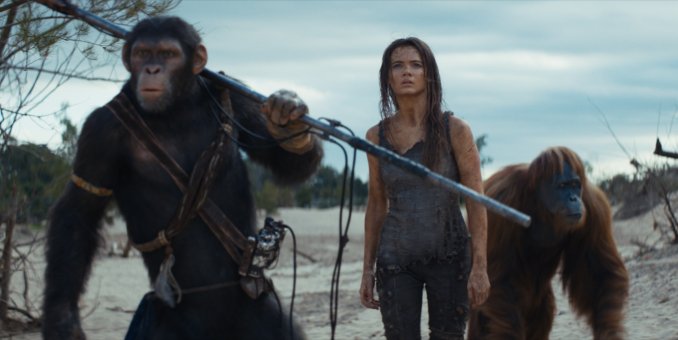
This time around we have the story of a peaceful ape tribe who is captured and forced to work as slaves for the self-stylized ape king Proximus Caesar who wants to break into a sealed bunker which he believes contains lost human technology. Hoping to free his clan, chimpanzee Noa is joined by the orangutan Raka and a human who might be more than she seems, as the trio attempts to thwart Proximus’s plans.
Perhaps fittingly because it is a franchise spawned from a novel by French writer Pierre Boulle, the Planet Of The Apes films have always had some thematic elements that place them closer to literary science fiction then most of their other cinematic genre brethren. The original series of five films, of course, dealt with such political issues as civil rights, living under the threat of nuclear annihilation, the anti-war movement, abortion and the 1965 Watts Riots. The more recent trilogy of films dealt with such topics as bioethics, as well as more humanistic themes of pride and the personal cost of revenge. Even Tim Burton much maligned Planet Of The Apes film from 2001 had a strong anti-gun message to it, ironically delivered in the person of a cameo-ing Charlton Heston.
Kingdom, however, does something a little different. Building on the lore established in the previous three films that rebooted the franchise, it suggests a parallel between early Christian factions in the way that the teachings of Caesar, the first ape who talked and whom ape society now revere as their “Lawgiver,” have been interpreted and implemented by two different groups of apes a century later. Some see his teachings as peaceful, while others see them as a call to more militancy. Now I will admit, my knowledge of the first couple of centuries of Christian history is somewhat lacking in nuance and detail, so I will leave it to the more scholarly out there to further develop this idea. The last installment, 2017’s War For The Planet Of The Apes, fluctuated back and forth on presenting Caesar as something of either a Moses or Christ figure, so the foundation for this kind of development has been strongly established.
The one drawback to this film is that as the third act resolves it’s own storylines, these resolution create new story possibilities for the almost inevitable sequel that will follow. Unfortunately, director Ball lingers on these possibilities a little too long. It is a tantalizing glimpse of a future that, given the current trend of depressed theatrical box office returns for big films such as Kingdom Of The Planet Of The Apes, we might not get to see. And that is a bit of a pessimistic down-note to end on.




